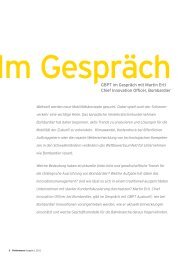PERF RMANCE 04 - The Performance Portal - Ernst & Young
PERF RMANCE 04 - The Performance Portal - Ernst & Young
PERF RMANCE 04 - The Performance Portal - Ernst & Young
Create successful ePaper yourself
Turn your PDF publications into a flip-book with our unique Google optimized e-Paper software.
Making a world of difference<br />
Setting the scene (take 2)<br />
Intercultural teams often claim the work<br />
does not “flow” — even if they try to be<br />
tolerant and have a sense of sympathy for<br />
each other, conflicts pop up repeatedly.<br />
When intercultural teams have difficulty<br />
performing, the usual response is to<br />
provide cultural awareness training.<br />
In these classes, cultural backgrounds<br />
and traditions are discussed, general<br />
communication rules in the respective<br />
cultures are analyzed, and more effective<br />
interaction techniques are taught.<br />
What’s missing?<br />
First, the different cultural groups are<br />
trained separately from one another, and<br />
the scenarios used for practice are rather<br />
general. What is needed is for participants<br />
to focus together in one group on situations<br />
that are relevant to their collaboration, that<br />
have an impact on the team’s performance.<br />
Second, cultural awareness training tends<br />
to focus almost entirely on communication.<br />
While this is a helpful approach, it doesn’t<br />
go far enough. Participants get the<br />
impression that they simply have to invest<br />
more effort to communicate successfully<br />
and all differences will then be resolved.<br />
What’s needed?<br />
Intercultural teams need support in their<br />
collaboration. Most goal conflicts come<br />
from dissimilar expectations about how the<br />
work should be done and how performance<br />
should be managed. <strong>The</strong>se expectations<br />
can differ for any factors influencing<br />
performance. <strong>The</strong> aim of performance<br />
improvement for intercultural teams should<br />
be to understand each other’s expectations<br />
towards performance management and<br />
to reach an agreement about how to<br />
collaborate. Once the expectations match<br />
and the mechanics of the collaboration are<br />
specified and agreed to, the interactions on<br />
the communicative level can be resolved.<br />
“ <strong>The</strong> aim of performance improvement<br />
for intercultural teams should be to<br />
understand each other’s expectations<br />
towards performance management<br />
and to reach an agreement about<br />
how to collaborate.”<br />
Setting the scene (take 3)<br />
Let’s imagine two companies, Otto<br />
Normalverbraucher GmbH (the German<br />
equivalent of John Doe Ltd.) and Saito<br />
Corp. (the Japanese equivalent of John<br />
Doe Ltd.), have merged, and new mixed<br />
work teams have been established. Six<br />
months later, it is a fact: the collaboration<br />
has failed. <strong>The</strong> German colleagues<br />
question their Japanese colleagues’<br />
need for extensive consultations over<br />
tiny details. It makes the Germans doubt<br />
the qualifications of the Japanese team<br />
members. From the German perspective,<br />
the Japanese need much more leadership<br />
than they consider normal among<br />
colleagues, because the Japanese<br />
continually come back with new questions.<br />
<strong>The</strong> Japanese sense similar difficulties in<br />
the collaboration. <strong>The</strong>y feel that they lack<br />
information about the overall project and<br />
consider the Germans to be individualistic,<br />
rude, and extremely unproductive due to<br />
their maverick work style.<br />
Even if the Japanese and the Germans<br />
communicated with the tongues of angels<br />
they still could not work together smoothly.<br />
At the root of the problem are their<br />
dissimilar expectations about collaboration<br />
— a world of differences.<br />
Sustainable collaboration<br />
When cultural awareness training focuses<br />
on communication barriers, the foundation<br />
for a high performing intercultural team<br />
is missing. Like most performance<br />
improvement solutions, this one calls for<br />
a phased approach where collaboration is<br />
constructed on a solid base.<br />
<strong>The</strong> program Collaboration.Excellence<br />
strives to create sustainable improvements<br />
in the collaboration of intercultural teams<br />
and thus acknowledges the requirement<br />
that intercultural teams need to pass<br />
through three phases geared specifically to<br />
their performance in the workplace:<br />
• Intercultural awareness<br />
• Shared performance system<br />
• Intercultural skills<br />
25






